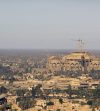The Knesset adopted the 2025 budget at the end of March. After three months without a budget and just days before the March 31 deadline for adoption, the Knesset passed the 2025 budget on March 25 by a majority of 66 to 52, thus ensuring the continuation of the governing coalition. The budget amounts to NIS 756 billion (EUR 180 billion), including NIS 619.6 billion excluding debt service, a 21% increase compared to 2024, bringing it to its highest level in history. It targets a budget deficit of 4.9% of GDP.
Planned spending is particularly high for defense, the largest budget item (NIS 110 billion), and also meets most of the coalition parties’ demands.
Defense and security spending accounts for a significant portion of public resources.
The 2025 budget was adopted in a deteriorating economic climate, with rising public debt (68% of GDP at the end of 2024 compared to 62% at the end of 2023) and a more modest growth rate (0.9% in 2024 compared to 2% in 2023 and 6.5% in 2022). The budget framework sets a deficit target of 4.4% of GDP, with a reserve of NIS 4 billion in the event of a security escalation, which would then increase the deficit to 4.9%.
The largest expenditure item is defense (NIS 110 billion), a 67% increase compared to the initial 2024 budget, but still 28% lower than the total expenditure recorded in 2024 (NIS 149.5 billion), following the three revised budgets passed by the government. This is followed by the Ministry of Education budget, to which more than NIS 92 billion are allocated, and the Ministry of Health budget at NIS 59 billion.
The Social Security budget amounts to NIS 61 billion, with NIS 25 billion transferred to the Ministry of National Security and NIS 25 billion allocated to pensions and allowances.
Austerity and fiscal adjustment measures are planned to finance these exceptional expenditures. The Israeli government has implemented a 5% cross-cutting cut in civilian spending (affecting health, education, and social services), an increase in VAT from 17% to 18%, an increase in social security contributions, particularly for national insurance, the maintenance of income tax brackets, and a wage freeze in the public sector.
The opposition has criticized the increased tax burden, with the additional burden estimated at NIS 7,000 per year for an average household; it has warned of the long-term risks that increased defense spending poses to the Israeli economy and society. The Central Bank is concerned about a debt-to-GDP ratio that could stagnate at a high level or even increase to 72% of GDP, which would send a negative signal to the markets and rating agencies.
The interests of the coalition parties are being protected, to the detriment of growth drivers.
Coalition funds have been ring-fenced (NIS 5.4 billion), and ministries deemed unnecessary by the Finance Ministry’s budget department at the end of 2024 have not been closed. While the government plans to increase infrastructure spending (transport, construction, energy, and water) to NIS 46.5 billion, or 7.5% of the net budget (approximately 1.8% of GDP), compared to NIS 38.5 billion in 2024, this effort is considered insufficient as the Jewish state needs to catch up in this area.
Furthermore, the 2025 budget proposes neither ambitious measures to stimulate the engines of economic growth nor reforms of public services, the labor market, or taxation (in substance). It is worth noting, however, the Finance Minister’s initiative to combat the underground economy through the complete digitalization of the tax system. The underground economy is estimated at 19% of GDP in Israel, compared to an OECD average of 12%.
Source: French Embassy in Tel Aviv


 here">
here">






Réagissez à cet article